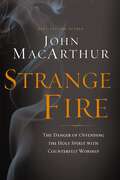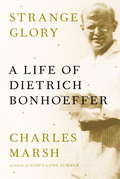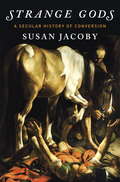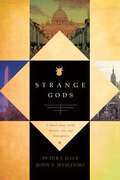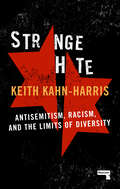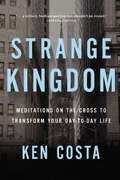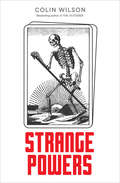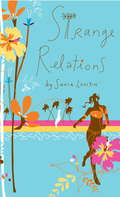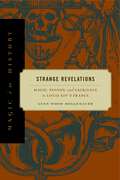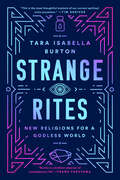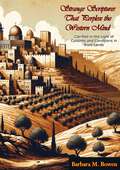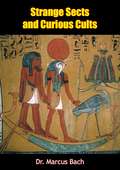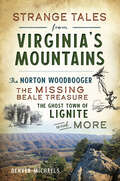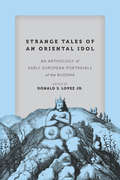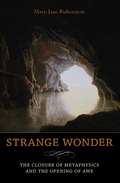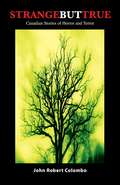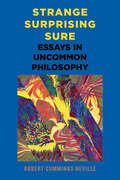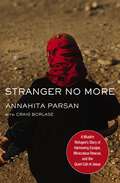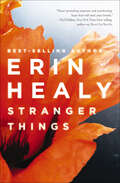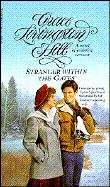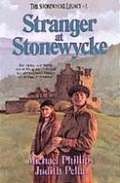- Table View
- List View
Strange Fire: The Danger of Offending the Holy Spirit with Counterfeit Worship
by John F. MacArthurIn Strange Fire, bestselling author and pastor John MacArthur chronicles the unsavory history behind the modern Charismatic movement.What would God say about those who blatantly misrepresent His Holy Spirit; who exchange true worship for chaotic fits of mindless ecstasy; who replace the biblical gospel with vain illusions of health and wealth; who claim to prophesy in His name yet speak errors; and who sell false hope to desperate people for millions of dollars?The charismatic movement has always been a breeding-ground for scandal, greed, bad doctrine, and all kinds of spiritual chicanery. As a movement, it is clearly headed the wrong direction. And it is growing at an unprecedented rate.From the Word of Faith to the New Apostolic Reformation, the Charismatic movement is being consumed by the empty promises of the prosperity gospel. Too many charismatic celebrities promote a &“Christianity&” without Christ, a Holy Spirit without holiness. And their teaching is having a disastrous influence on a grand scale, as large television networks broadcast their heresies to every part of the world.In Strange Fire, MacArthur lays out a chilling case against the modern Charismatic movement that includes:Rejecting its false prophets.Speaking out against their errors.Showing true reverence to the Holy Spirit.Clinging to the Bible as the inerrant, authoritative Word of God and the one true standard by which all truth claims must be tested.
Strange Glory
by Charles MarshIn the decades since his execution by the Nazis in 1945, Dietrich Bonhoeffer, the German pastor, theologian, and anti-Hitler conspirator, has become one of the most widely read and inspiring Christian thinkers of our time. Now, drawing on extensive new research, Strange Glory offers a definitive account, by turns majestic and intimate, of this modern icon. The scion of a grand family that rarely went to church, Dietrich decided as a thirteen-year-old to become a theologian. By twenty-one, the rather snobbish and awkward young man had already written a dissertation hailed by Karl Barth as a "theological miracle." But it was only the first step in a lifelong effort to recover an authentic and orthodox Christianity from the dilutions of liberal Protestantism and the modern idolatries of blood and nation--which forces had left the German church completely helpless against the onslaught of Nazism. From the start, Bonhoeffer insisted that the essence of Christianity was not its abstract precepts but the concrete reality of the shared life in Christ. In 1930, his search for that true fellowship led Bonhoeffer to America for ten fateful months in the company of social reformers, Harlem churchmen, and public intellectuals. Energized by the lived faith he had seen, he would now begin to make what he later saw as his definitive "turn from the phraseological to the real." He went home with renewed vocation and took up ministry among Berlin's downtrodden while trying to find his place in the hoary academic establishment increasingly captive to nationalist fervor. With the rise of Hitler, however, Bonhoeffer's journey took yet another turn. The German church was Nazified, along with every other state-sponsored institution. But it was the Nuremberg laws that set Bonhoeffer's earthly life on an ineluctable path toward destruction. His denunciation of the race statutes as heresy and his insistence on the church's moral obligation to defend all victims of state violence, regardless of race or religion, alienated him from what would become the Reich church and even some fellow resistors. Soon the twenty-seven-year-old pastor was one of the most conspicuous dissidents in Germany. He would carry on subverting the regime and bearing Christian witness, whether in the pastorate he assumed in London, the Pomeranian monastery he established to train dissenting ministers, or in the worldwide ecumenical movement. Increasingly, though, Bonhoeffer would find himself a voice crying in the wilderness, until, finally, he understood that true moral responsibility obliged him to commit treason, for which he would pay with his life. Charles Marsh brings Bonhoeffer to life in his full complexity for the first time. With a keen understanding of the multifaceted writings, often misunderstood, as well as the imperfect man behind the saintly image, here is a nuanced, exhilarating, and often heartrending portrait that lays bare Bonhoeffer's flaws and inner torment, as well as the friendships and the faith that sustained and finally redeemed him. Strange Glory is a momentous achievement. From the Hardcover edition.
Strange Glory
by Charles MarshIn the decades since his execution by the Nazis in 1945, Dietrich Bonhoeffer, the German pastor, theologian, and anti-Hitler conspirator, has become one of the most widely read and inspiring Christian thinkers of our time. Now, drawing on extensive new research, Strange Glory offers a definitive account, by turns majestic and intimate, of this modern icon. The scion of a grand family that rarely went to church, Dietrich decided as a thirteen-year-old to become a theologian. By twenty-one, the rather snobbish and awkward young man had already written a dissertation hailed by Karl Barth as a "theological miracle." But it was only the first step in a lifelong effort to recover an authentic and orthodox Christianity from the dilutions of liberal Protestantism and the modern idolatries of blood and nation--which forces had left the German church completely helpless against the onslaught of Nazism. From the start, Bonhoeffer insisted that the essence of Christianity was not its abstract precepts but the concrete reality of the shared life in Christ. In 1930, his search for that true fellowship led Bonhoeffer to America for ten fateful months in the company of social reformers, Harlem churchmen, and public intellectuals. Energized by the lived faith he had seen, he would now begin to make what he later saw as his definitive "turn from the phraseological to the real." He went home with renewed vocation and took up ministry among Berlin's downtrodden while trying to find his place in the hoary academic establishment increasingly captive to nationalist fervor. With the rise of Hitler, however, Bonhoeffer's journey took yet another turn. The German church was Nazified, along with every other state-sponsored institution. But it was the Nuremberg laws that set Bonhoeffer's earthly life on an ineluctable path toward destruction. His denunciation of the race statutes as heresy and his insistence on the church's moral obligation to defend all victims of state violence, regardless of race or religion, alienated him from what would become the Reich church and even some fellow resistors. Soon the twenty-seven-year-old pastor was one of the most conspicuous dissidents in Germany. He would carry on subverting the regime and bearing Christian witness, whether in the pastorate he assumed in London, the Pomeranian monastery he established to train dissenting ministers, or in the worldwide ecumenical movement. Increasingly, though, Bonhoeffer would find himself a voice crying in the wilderness, until, finally, he understood that true moral responsibility obliged him to commit treason, for which he would pay with his life. Charles Marsh brings Bonhoeffer to life in his full complexity for the first time. With a keen understanding of the multifaceted writings, often misunderstood, as well as the imperfect man behind the saintly image, here is a nuanced, exhilarating, and often heartrending portrait that lays bare Bonhoeffer's flaws and inner torment, as well as the friendships and the faith that sustained and finally redeemed him. Strange Glory is a momentous achievement. From the Hardcover edition.
Strange Glory
by Charles MarshIn the decades since his execution by the Nazis in 1945, Dietrich Bonhoeffer, the German pastor, theologian, and anti-Hitler conspirator, has become one of the most widely read and inspiring Christian thinkers of our time. Now, drawing on extensive new research, Strange Glory offers a definitive account, by turns majestic and intimate, of this modern icon. The scion of a grand family that rarely went to church, Dietrich decided as a thirteen-year-old to become a theologian. By twenty-one, the rather snobbish and awkward young man had already written a dissertation hailed by Karl Barth as a "theological miracle." But it was only the first step in a lifelong effort to recover an authentic and orthodox Christianity from the dilutions of liberal Protestantism and the modern idolatries of blood and nation--which forces had left the German church completely helpless against the onslaught of Nazism. From the start, Bonhoeffer insisted that the essence of Christianity was not its abstract precepts but the concrete reality of the shared life in Christ. In 1930, his search for that true fellowship led Bonhoeffer to America for ten fateful months in the company of social reformers, Harlem churchmen, and public intellectuals. Energized by the lived faith he had seen, he would now begin to make what he later saw as his definitive "turn from the phraseological to the real." He went home with renewed vocation and took up ministry among Berlin's downtrodden while trying to find his place in the hoary academic establishment increasingly captive to nationalist fervor. With the rise of Hitler, however, Bonhoeffer's journey took yet another turn. The German church was Nazified, along with every other state-sponsored institution. But it was the Nuremberg laws that set Bonhoeffer's earthly life on an ineluctable path toward destruction. His denunciation of the race statutes as heresy and his insistence on the church's moral obligation to defend all victims of state violence, regardless of race or religion, alienated him from what would become the Reich church and even some fellow resistors. Soon the twenty-seven-year-old pastor was one of the most conspicuous dissidents in Germany. He would carry on subverting the regime and bearing Christian witness, whether in the pastorate he assumed in London, the Pomeranian monastery he established to train dissenting ministers, or in the worldwide ecumenical movement. Increasingly, though, Bonhoeffer would find himself a voice crying in the wilderness, until, finally, he understood that true moral responsibility obliged him to commit treason, for which he would pay with his life. Charles Marsh brings Bonhoeffer to life in his full complexity for the first time. With a keen understanding of the multifaceted writings, often misunderstood, as well as the imperfect man behind the saintly image, here is a nuanced, exhilarating, and often heartrending portrait that lays bare Bonhoeffer's flaws and inner torment, as well as the friendships and the faith that sustained and finally redeemed him. Strange Glory is a momentous achievement. From the Hardcover edition.
Strange Gods
by Susan JacobyIn a groundbreaking historical work that addresses religious conversion in the West from an uncompromisingly secular perspective, Susan Jacoby challenges the conventional narrative of conversion as a purely spiritual journey. From the transformation on the road to Damascus of the Jew Saul into the Christian evangelist Paul to a twenty-first-century "religious marketplace" in which half of Americans have changed faiths at least once, nothing has been more important in the struggle for reason than the right to believe in the God of one's choice or to reject belief in God altogether. Focusing on the long, tense convergence of Judaism, Christianity, and Islam--each claiming possession of absolute truth--Jacoby examines conversions within a social and economic framework that includes theocratic coercion (unto torture and death) and the more friendly persuasion of political advantage, economic opportunism, and interreligious marriage. Moving through time, continents, and cultures--the triumph of Christianity over paganism in late antiquity, the Spanish Inquisition, John Calvin's dour theocracy, Southern plantations where African slaves had to accept their masters' religion--the narrative is punctuated by portraits of individual converts embodying the sacred and profane. The cast includes Augustine of Hippo; John Donne; the German Jew Edith Stein, whose conversion to Catholicism did not save her from Auschwitz; boxing champion Muhammad Ali; and former President George W. Bush. The story also encompasses conversions to rigid secular ideologies, notably Stalinist Communism, with their own truth claims. Finally, Jacoby offers a powerful case for religious choice as a product of the secular Enlightenment. In a forthright and unsettling conclusion linking the present with the most violent parts of the West's religious past, she reminds us that in the absence of Enlightenment values, radical Islamists are persecuting Christians, many other Muslims, and atheists in ways that recall the worst of the Middle Ages.(With 8 pages of black-and-white illustrations.)From the Hardcover edition.
Strange Gods: A Secular History of Conversion
by Susan JacobyIn a groundbreaking historical work that addresses religious conversion in the West from an uncompromisingly secular perspective, Susan Jacoby challenges the conventional narrative of conversion as a purely spiritual journey. From the transformation on the road to Damascus of the Jew Saul into the Christian evangelist Paul to a twenty-first-century “religious marketplace” in which half of Americans have changed faiths at least once, nothing has been more important in the struggle for reason than the right to believe in the God of one’s choice or to reject belief in God altogether. Focusing on the long, tense convergence of Judaism, Christianity, and Islam—each claiming possession of absolute truth—Jacoby examines conversions within a social and economic framework that includes theocratic coercion (unto torture and death) and the more friendly persuasion of political advantage, economic opportunism, and interreligious marriage. Moving through time, continents, and cultures—the triumph of Christianity over paganism in late antiquity, the Spanish Inquisition, John Calvin’s dour theocracy, Southern plantations where African slaves had to accept their masters’ religion—the narrative is punctuated by portraits of individual converts embodying the sacred and profane. The cast includes Augustine of Hippo; John Donne; the German Jew Edith Stein, whose conversion to Catholicism did not save her from Auschwitz; boxing champion Muhammad Ali; and former President George W. Bush. The story also encompasses conversions to rigid secular ideologies, notably Stalinist Communism, with their own truth claims. Finally, Jacoby offers a powerful case for religious choice as a product of the secular Enlightenment. In a forthright and unsettling conclusion linking the present with the most violent parts of the West’s religious past, she reminds us that in the absence of Enlightenment values, radical Islamists are persecuting Christians, many other Muslims, and atheists in ways that recall the worst of the Middle Ages.(With 8 pages of black-and-white illustrations.)From the Hardcover edition.
Strange Gods: A novel about Faith, Murder, Sin, and Redemption
by Peter Daly John MyslinskiMICHAEL MANNING was the sixth cardinal among the international Catholic clergy to die under violent and suspicious circumstances. Somebody is killing cardinals. But what is going on and why? With the latest death, the Vatican is forced to act. The Church pulls Nate Condon, a young New York attorney, into the investigation. As the history of the crimes unfolds, we are drawn inside the magnificent city of Rome, her ancient secrets, and the most privileged inner sanctums of the Catholic hierarchy. In the midst of Nate's investigation, more tragedy befalls the Church: The pope dies, a Vatican cardinal commits suicide, and the Mafia murders Nate's primary contact, a self-loathing gay monsignor who is knee-deep in scandal. Soon after, an American cardinal, determined to change the corruption deep within the Church, is elected as the new pope. Will he be able to narrow the divide that is destroying everything he holds dear, or will the schism that separates the Church win out? Strange Gods was written by two priests with firsthand knowledge of the degree to which the Church will go to cover up financial corruption, abuse of power, sexual scandal, and evil. With an eye on the holiness and grace of ordinary people who keep the church alive and want to change her future, Strange Gods is an exciting, engaging, and thought-provoking read.
Strange Hate: Antisemitism, Racism and the Limits of Diversity
by Keith Kahn-harrisKeith Kahn-Harris argues that the controversy over antisemitism today is a symptom of a growing "selectivity" in anti-racism caused by a failure to engage with the challenges that diverse societies pose.How did antisemitism get so strange? How did hate become so clouded in controversy? And what does the strange hate of antisemitism tell us about racism and the politics of diversity today?Life-long anti-racists accused of antisemitism, life-long Jew haters declaring their love of Israel... Today, antisemitism has become selective. Non-Jews celebrate the "good Jews" and reject the "bad Jews". And its not just antisemitism that's becoming selective, racists and anti-racists alike are starting to choose the minorities they love and hate.In this passionate yet closely-argued polemic from a writer with an intimate knowledge of the antisemitism controversy, Keith Kahn-Harris argues that the emergence of strange hatreds shows how far we are from understanding what living in diverse societies really means.Strange Hate calls for us to abandon selective anti-racism and rethink how we view not just Jews and antisemitism, but the challenge of living with diversity.
Strange Kingdom: Meditations on the Cross to Transform Your Day-to-Day Life
by Ken CostaExperience how the power of the cross unleashes meaning and purpose in the midst of your daily life.This meditative and spiritual reflection by Ken Costa considers the cross and the king who died upon it. Christ&’s work on the cross established a kingdom that is strange indeed, if a king died on the cross in order to establish it. It is a kingdom where suffering and abandonment are transformed into the power of presence and live, a kingdom where a King exchanges gifts of great value for worthless dross, where a robber becomes righteous, and a criminal becomes the first citizen of heaven. Spend some time as Easter draws near considering the strange, upside-down kingdom, where broken things are made whole.&“A king who dies on the cross must be the king of a rather strange kingdom.&” —Dietrich Bonhoeffer"Strange Kingdom is a joy. In my 47 years in the Christian publishing business, Ken Costa&’s compelling and inspirational reflections are unique on the meaning and purpose of the cross of Christ. A must-read for every Christian and a revelation for the spiritually curious.&”—Joey Paul, Senior Editor, HarperCollins Christian Publishing, Nashville, TN &“Ken Costa masterfully and meticulously gives us an in-depth look at the cross of Jesus and what it means to us in our everyday lives.&” —Robert Morris, Senior Pastor, Gateway Church, Southlake, TX&“Ken Costa&’s deep love for God and unashamed defense of the cross of Jesus Christ is mirrored in this book. The perspective of a banker, the mind of a scholar, and the heart of a Christian who wants people to love Christ radiates on every page.&” —R. T. Kendall, author and former minister of Westminster Chapel, England&“. . . a fresh revelation of Christ and the power of the cross.&”—Joseph Prince, Senior Pastor, New Creation Church, Singapore&“Not since John Stott&’s The Cross of Christ have I read a book on the saving work of Jesus that I want to return to again and again as much as this one.&” —Miles Toulmin, Vicar, HTBB, Kuala Lumpur, Malaysia&“This book will encourage your faith and deepen your understanding of what the cross means to people in their day-to-day lives.&” —Jentezen Franklin, Senior Pastor, Free Chapel, Gainesville, GA &“His honesty opens a window onto the meaning of the cross and the upside-down world it invites us in.&” —Justin Welby, Archbishop of Canterbury, England
Strange Powers
by Colin WilsonThree case studies in the paranormal shed light on the limits of human potential. During his research for his major study The Occult, Colin Wilson became fascinated by three people whom he interviewed extensively. Strange Powers compiles and analyzes the compelling stories of Robert Leftwich, a retired sales manager in Sussex with proven powers as a dowser who also is able to take journeys out of his physical body; Mrs. Eunice Beattie, a hospital nurse, who has written hundreds of pages of predictions dictated to her by &“spirits&”; and Dr. Arthur Guirdham, a respected British physician, who is convinced that he is a reincarnated member of a thirteenth-century religious sect, about which he has written voluminously and accurately. All three consider their powers to be perfectly normal. If this is so, are the rest of us abnormal? Or subnormal? Colin Wilson challenges us to consider these questions, as well as the problem of how to gain scientific recognition for those vistas of reality that lie outside the experience of most of us, but that almost certainly exist.
Strange Relations
by Sonia LevitinA summer in paradise. That's all Marne wants. That's all she can think of when she asks her parents permission to spend the summer in Hawaii with Aunt Carole and her family. But Marne quickly realizes her visit isn't going to be just about learning to surf and morning runs along the beach, despite the cute surfer boy she keeps bumping into. For one thing, Aunt Carole isn't even Aunt Carole anymore—she's Aunt Chaya, married to a Chasidic rabbi and deeply rooted in her religious community. Nothing could be more foreign to Marne, and fitting into this new culture—and house full of kids—is a challenge. But as she settles into her newfound family's daily routine, she begins to think about spirituality, identity, and finding a place in the world in a way she never has before. This rich novel is a window into a different life and gets to the very heart of faith, identity, and family ties. From the Hardcover edition.
Strange Revelations: Magic, Poison, and Sacrilege in Louis XIV's France (Magic in History)
by Lynn Wood MollenauerThe Affair of the Poisons was the greatest court scandal of the seventeenth century. From 1679 to 1682 the French crown investigated more than 400 people—including Louis XIV’s official mistress and members of the highest-ranking circles at court—for sensational crimes. In Strange Revelations, Lynn Mollenauer brings this bizarre story to life, exposing a criminal magical underworld thriving in the heart of the Sun King’s capital. The macabre details of the Affair of the Poisons read like a gothic novel. In the fall of 1678, Nicolas de la Reynie, head of the Paris police, uncovered a plot to poison Louis XIV. La Reynie’s subsequent investigation unveiled a loosely knit community of sorceresses, magicians, and renegade priests who offered for sale an array of services and products ranging from abortions to love magic to poisons known as “inheritance powders.” It was the inheritance powders (usually made from powdered toads steeped in arsenic) that lent the Affair of the Poisons its name. The purchasers of the powders gave the affair its notoriety, for the scandal extended into the most exalted ranks of the French court. Mollenauer adroitly uses the Affair of the Poisons to uncover the hidden forms of power that men and women of all social classes invoked to achieve their goals. While the exercise of state power during the ancien régime was quintessentially visible—ritually displayed through public ceremonies—the affair exposes the simultaneous presence of other imagined and real sources of power available to the Sun King’s subjects: magic, poison, and the manipulation of sexual passions. Highly entertaining yet deeply researched, Strange Revelations will appeal to anyone interested in the history of court society, gender, magic, or crime in early modern Europe.
Strange Rites: New Religions for a Godless World
by Tara Isabella BurtonA sparklingly strange odyssey through the kaleidoscope of America's new spirituality: the cults, practices, high priests and prophets of our supposedly post-religion age.55 years have passed since the cover of Time Magazine proclaimed the death of God and while participation in mainstream religion has indeed plummeted, Americans have never been more spiritually busy. While rejecting traditional worship in unprecedented numbers, today's Americans are embracing a kaleidoscopic panoply of spiritual traditions, rituals, and subcultures --from astrology and witchcraft to SoulCycle and the alt-right. As the Internet makes it ever-easier to find new "tribes," and consumer capitalism forever threatens to turn spirituality into a lifestyle brand, remarkably modern American religious culture is undergoing a revival comparable with the Great Awakenings of centuries past. Faith is experiencing not a decline but a Renaissance. Disillusioned with organized religion and political establishments alike, more and more Americans are seeking out spiritual paths driven by intuition, not institutions. In Strange Rites, religious scholar and commentator Tara Isabella Burton visits with the techno-utopians of Silicon Valley; Satanists and polyamorous communities, witches from Bushwick, wellness junkies and social justice activists and devotees of Jordan Peterson, proving Americans are not abandoning religion but remixing it. In search of the deep and the real, they are finding meaning, purpose, ritual, and communities in ever-newer, ever-stranger ways.
Strange Scriptures That Perplex the Western Mind: Clarified in the Light of Customs and Conditions in Bible Lands
by Barbara M. BowenDelve into the intriguing world of biblical interpretation with Barbara M. Bowen's Strange Scriptures That Perplex the Western Mind. This enlightening book offers readers a comprehensive guide to understanding the cultural, historical, and linguistic contexts of various biblical passages that often confuse or perplex modern Western readers.Barbara M. Bowen, an esteemed biblical scholar and educator, provides a detailed exploration of scriptures that seem mysterious or contradictory when viewed through a contemporary Western lens. By shedding light on the ancient customs, traditions, and idiomatic expressions of the times, Bowen reveals the true meanings and profound wisdom contained within these passages.Strange Scriptures That Perplex the Western Mind covers a wide range of topics, including enigmatic sayings, puzzling parables, and complex metaphors found in both the Old and New Testaments. Bowen's accessible and engaging writing style makes these ancient texts come alive, offering readers new insights and a deeper appreciation for the richness of the biblical narrative.The book is organized thematically, making it easy for readers to navigate and find explanations for specific passages that have long puzzled them. Bowen's thorough research and thoughtful analysis provide clear and concise interpretations that bridge the gap between ancient and modern understanding.This book is an invaluable resource for anyone seeking to deepen their understanding of the Bible, whether they are students of theology, clergy, or lay readers. Strange Scriptures That Perplex the Western Mind not only clarifies confusing passages but also enriches the reader's overall comprehension of the Bible's message and its relevance to contemporary life.
Strange Sects and Curious Cults
by Dr Marcus BachStrange Sects and Curious Cults, first published in 1961, is a well-written overview of a number of important religious sects and cults. Author Marcus Bach divides these into three categories: the sex sects, conscience cults, and the utopianists.The first group includes ancient Baalism of Mesopotamia, Osirism of Egypt, Shivism of India, and more recently, Voodoo of Africa and the New World. The Conscience Cults include the Penitentes, Apocalypticists, Father Divine of Harlem, the Oxford Groupers, and Psychiana. The section on Utopians includes the now-vanished Russian Doukhobors, followed by the Shakers, Amanas, Hutterites, and Mormons.For anyone looking for a good introduction to offbeat religious groups, Strange Sects and Curious Cults will provide a useful background and serve as a basis for further research.
Strange Tales from Virginia's Mountains: The Norton Woodbooger, The Missing Beale Treasure, The Ghost Town of Lignite and More
by Denver MichaelsExplore the mysterious side of Virginia with these strange tales of Bigfoot, buried treasure, phantom dogs, UFOs, ghosts, and more. The stunning mountains of Virginia offer spectacular views and endless outdoor activities, yet they also hold secrets. A nineteenth-century cache of gold is buried in the hills. Nine-foot giants once walked the ridges, pre-Columbian explorers built homes on isolated mountaintops and a ghost town lies deep in the Jefferson National Forest. The mountains conceal canines that walk upright, black panthers and a resurgent mountain lion population. The hide-and-seek champion of the world, Bigfoot, lurks in the dark hollows, phantom dogs pace the back roads and aggressive monkeys swing through the trees. UFOs crisscross the skies, and ghosts haunt the caverns below. Join Denver Michaels, local author and explorer of the unexplained, as he explores these mysteries and many more.
Strange Tales of an Oriental Idol: An Anthology of Early European Portrayals of the Buddha
by Donald S. Lopez Jr.We tend to think that the Buddha has always been seen as the compassionate sage admired around the world today, but until the nineteenth century, Europeans often regarded him as a nefarious figure, an idol worshipped by the pagans of the Orient. Donald S. Lopez Jr. offers here a rich sourcebook of European fantasies about the Buddha drawn from the works of dozens of authors over fifteen hundred years, including Clement of Alexandria, Marco Polo, St. Francis Xavier, Voltaire, and Sir William Jones. Featuring writings by soldiers, adventurers, merchants, missionaries, theologians, and colonial officers, this volume contains a wide range of portraits of the Buddha. The descriptions are rarely flattering, as all manner of reports--some accurate, some inaccurate, and some garbled--came to circulate among European savants and eccentrics, many of whom were famous in their day but are long forgotten in ours. Taken together, these accounts present a fascinating picture, not only of the Buddha as he was understood and misunderstood for centuries, but also of his portrayers.
Strange Wonder: The Closure of Metaphysics and the Opening of Awe (Insurrections: Critical Studies in Religion, Politics, and Culture)
by Mary-Jane RubensteinStrange Wonder confronts Western philosophy's ambivalent relationship to the Platonic "wonder" that reveals the strangeness of the everyday. On the one hand, this wonder is said to be the origin of all philosophy. On the other hand, it is associated with a kind of ignorance that ought to be extinguished as swiftly as possible. By endeavoring to resolve wonder's indeterminacy into certainty and calculability, philosophy paradoxically secures itself at the expense of its own condition of possibility.Strange Wonder locates a reopening of wonder's primordial uncertainty in the work of Martin Heidegger, for whom wonder is first experienced as the shock at the groundlessness of things and then as an astonishment that things nevertheless are. Mary-Jane Rubenstein traces this double movement through the thought of Emmanuel Levinas, Jean-Luc Nancy, and Jacques Derrida, ultimately thematizing wonder as the awesome, awful opening that exposes thinking to devastation as well as transformation. Rubenstein's study shows that wonder reveals the extraordinary in and through the ordinary, and is therefore crucial to the task of reimagining political, religious, and ethical terrain.
Strange but True: Canadian Stories of Horror and Terror
by John Robert ColomboThis is a chilling collection of 50 accounts of truly unusual events and experiences that are told by the people who experienced them. Are there ghosts here? Yes. Are there strange coincidences here? Yes. Are there strange creatures of the forest here? Yes. Are there conspiracies here? Yes. Are there horors here aplenty? Yes, yes! The accounts come from many regions of Canada and cover the last hundred or so years. These fascinating first-person accounts originate in the columns of old newspapers or in the highly readable narratives derived from correspondence conducted by the author with present-day witnesses. Shake hands with your fears and dreads. Here are engrossing and unsettling occurences that are supernatural or psychical, paranormal, or parapsychological, all betweent he covers of one book. Not for the faint of heart! Highly exciting reading!
Strange, Surprising, Sure: Essays in Uncommon Philosophy
by Robert Cummings NevilleIn Strange, Surprising, Sure, Robert Cummings Neville presents a theory of being, change, and value, and engages other philosophers who deal with these concepts. The book's central thesis is that the entire created world includes everything determinate, and thus the creator does not exist within creation. Strangely, this reverses nearly everything in the Western tradition. Surprisingly, this thesis is approached from a great many angles, all of which are within the Western, South Asian, or East Asian traditions. Surely put, this thesis will win out in the long run. Although Neville writes for an English-reading audience, he engages with thinkers from all these traditions."
Stranger No More: A Muslim Refugee’s Story of Harrowing Escape, Miraculous Rescue, and the Quiet Call of Jesus
by Craig Borlase Annahita ParsanThere will be pain ahead, and trouble and problems that I won’t be able to fix on my own.But in them all, I know God will be there, calling me to look to him. Inviting me to take the next step toward his open arms.And I will say yes.And yes.And yes.Annahita Parsan was born into a Muslim family in Iran and grew up with the simple hope of one day finding a good husband, having children, and doing some good in the world. Married and a mother before she turned eighteen, Annahita found herself unexpectedly widowed and trapped for years in an abusive second marriage that she later fled—discovering instead a God who might love her.Stranger No More is the remarkable true story of Annahita’s path from oppression to the life-changing hope of Jesus. Fleeing Iran across the mountains into Turkey, she spent months in the terrifying Agri prison before a miraculous release and flight to Europe, where she and her two children knelt in a church and prayed, “God, from this day on we are Christians.”Filled with unthinkable circumstances, miraculous rescues, and the quietly constant voice of Jesus, Stranger No More leads readers deep into the heart of God and draws them toward the same call that Annahita heeds today: using her past to save others from theirs. As the leader of two congregations in Sweden, Annahita has baptized hundreds of former Muslims since her own conversion, has seen firsthand the powerful ways God is at work among those who have left Islam behind, and is reminded every day that saying yes to God is always worth the risk.
Stranger Online (TodaysGirls.com #1)
by Carol Smith Terry BrownMeet Amber. Mysterious, threatening emails end up in Amber's mailbox in her mailbox on the girls Web site. But only the Today'sGirls know about their new site! Suddenly, the stranger logs on during a routine nightly chat session. Who could this sixth person be? Amber's integrity -- and her spot on the swim team -- is called into question before she manages to solve the mystery and save her reputation.
Stranger Things
by Erin HealyIn the burnt-out hollow, a house of dark secrets and an eerie beauty beckon.Serena Diaz&’s life is imploding. A troubled student has accused the young biology teacher of sexual misconduct, cutting off her promising career just as it was starting to blossom. But that&’s just the beginning of Serena&’s problems.When a therapeutic walk in the woods leads her to a ruined house overtaken by criminals, Serena is assaulted and finds herself witness to the senseless murder of the one man who tries to help her.Hurled into a world of false accusations and hounded by the press, Serena must confront evil itself to unravel the mysterious visions—and terrifying danger—that pursue her. But she can&’t ignore the most haunting question: Why would a mysterious stranger give his life to save hers?The answer, if she can find it, will point the way to her freedom from evil men in a lascivious trade.&“With her typical flair and eloquence, Healy takes readers through an incredible journey that will leave you thinking long after the last page closes.&” —Lifeisstory.com&“Healy&’s latest is thought-provoking and engaging, and becomes even more so as the story progresses. The author uses courageous characters to address the sex trade crisis. Themes of hope and redemption are seamlessly woven with spiritual elements and a touch of the supernatural.&” —RT Book Reviews, 4 stars
Stranger Within The Gates (Grace Livingston Hill Ser. #14)
by Grace Livingston HillSylvia’s impulsive young brother has come home from college with astounding news--news that throws the entire Garland family into confusion: He is married, and to a most unsuitable young woman named Florimel! But Sylvia determines that she will reach out in love to the difficult and selfish young bride. But Florimel has plans of her own--plans to get her hands on her young husband’s inheritance. And in the process of carrying out her plans, she stirs up such strife and discord it seems that the Garland family will be torn apart, a fact that leaves Sylvia overcome with despair. And Sylvia’s despair only intensifies when the crisis at home seems to leave her no choice but to turn her back on her own chance at love.... Grace Livingston Hill's books remain popular because they are about young people who must struggle to overcome obstacles and strive toward a better future and find love along the way. Bookshare has over 42 of her over 100 books including: #50. The Finding of Jasper Holt, #55. Ladybird, #56 The Prodigal Girl , #60. Miranda, #61. Mystery Flowers, #66. The Girl From Montana, #67 A Daily Rate, #68. The Story of a Whim, #69. According to the Pattern,#70. in the way, #71. exit Betty, #72. The White Lady, #73. Not Under the Law, #74. Lo Michael, #76. The City of Fire, #77. The Ransom, #81. Duskin, #84. Cloudy Jewel, #85. Crimson Mountain,#86 The Mystery of Mary, #93. Katharine’s yesterday, #94. The Angel of His Presence, #95. Mary Arden, #96. because of Stephen, #98. Aunt Crete’s Emancipation,
Stranger at Stonewycke (Stonewycke Legacy #1)
by Judith Pella Michael R. PhillipsFrom the time the Picts settled in northern Scotland in the seventh century, until the region was overrun by the Vikings in the ninth, and then settled throughout the following centuries by the Scots, the estate known as Stonewycke became a symbol of the enduring quality of the land. When the castle of that same name was built by Andrew Ramsay in the 1540's, his prayer was that the estate would stand as a sentinel in the north to God's goodness. His prayers for the generations who would follow him in the Ramsay line resulted in blessings and prosperity to the family throughout the next two and a half centuries, finding special fulfillment in the righteousness of his descendant Anson Ramsey in the early nineteenth century.
